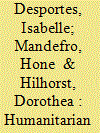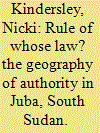|
|
|
Sort Order |
|
|
|
Items / Page
|
|
|
|
|
|
|
| Srl | Item |
| 1 |
ID:
164842


|
|
|
|
|
| Summary/Abstract |
Gambian irregular migration is a phenomenon that is well known and discussed within this small African nation, yet little is understood of the deep personal and socio-cultural motives to embark on the perilous journey across the Sahara towards Europe. This paper explores the ambitions and capabilities of Gambians who embark on irregular migration, or the so-called ‘backway’.
|
|
|
|
|
|
|
|
|
|
|
|
|
|
|
|
| 2 |
ID:
164838


|
|
|
|
|
| Summary/Abstract |
This article explores attitudes of Ghanaian traders towards an increasing Chinese influx into Ghanaian trading spaces and the impacts of Chinese merchants on Ghanaian traders and trading spaces. Despite a late entrance of Chinese merchants into Ghanaian trading spaces relative to Lebanese, Indians and Nigerians, the abrupt change in size of the Chinese trading community along with its huge capital and cheap goods have had big impacts on local trading spaces. We maintain that relations between Ghanaian traders and Chinese counterparts may be roughly described as complementary, collaborative and competitive. While the Chinese impacts are seen as positive by some Ghanaian traders and landlords, they are negative for others. Yet, we argue that these relations are also nuanced and rooted in each Ghanaian trader's position amidst the Chinese presence. This article contributes to the literature on dynamics of South-to-South movements. It adds to growing studies on contemporary Chinese emigrations and accompanying impacts in host communities.
|
|
|
|
|
|
|
|
|
|
|
|
|
|
|
|
| 3 |
ID:
164843


|
|
|
|
|
| Summary/Abstract |
For the latter decades of the last century, the Karamoja region of north-eastern Uganda was infamous as a place of violent cattle raids and road ambushes, populated by fierce warriors. Using primary data, this article examines the shifts from large-scale raiding to opportunistic theft as well as the profound transformation in the security environment over the past 10 years. We argue that the combination of a top-down sustained disarmament campaign and grassroots peace resolutions have created relative stability for the first time in decades. This stability has allowed for the expansion of markets, investments by national and international actors, and the rejuvenation of livelihoods for many residents. However, while large-scale violent cattle raids are largely a thing of the past, violence and insecurity have shifted to the domestic sphere in the form of small-scale but pervasive thefts and rampant domestic violence.
|
|
|
|
|
|
|
|
|
|
|
|
|
|
|
|
| 4 |
ID:
164839


|
|
|
|
|
| Summary/Abstract |
This article aims to rekindle the debate on the politics of aid in the increasingly common – yet still under-studied – authoritarian and low-intensity conflict settings, detailing the case of Ethiopia in 2016, when a 50-year drought coincided with a wave of protests and a state of emergency. During four months of qualitative fieldwork in 2017, state, civil society, Ethiopian and international actors were approached – from humanitarian headquarters to communities in the Amhara, Oromiya and Somali regions. Research participants relayed stark discrepancies between the humanitarian theatre's ‘frontstage’, where disaster responders showcase an exemplary response, and its ‘backstage’, where they remove their frontstage masks and reflect on the information, the decision-making monopoly of the state and the intrusion of conflict dynamics into the humanitarian response. In humanitarian research and in policy, a collective conversation is necessary on where to draw the line between respect for governments’ sovereignty and the intrusion of humanitarian principles.
|
|
|
|
|
|
|
|
|
|
|
|
|
|
|
|
| 5 |
ID:
164841


|
|
|
|
|
| Summary/Abstract |
This article examines the distribution of power among public, private and criminal interests invested in Mombasa port. It approaches Kenya as a gatekeeper state, in which national elites compete to control the country's points of interaction with the rest of the world. Mombasa's controversial private dry ports are used to highlight (1) how the opportunity to profit from inefficiencies in container storage has been distributed among the political elite, and (2) how the development of the country's principal seaport not only reflects Kenya's underlying political settlements, but is one of the key sites in which those settlements are tested and reshaped. The case exposes a dynamic interaction between Kenya's shifting political settlement on the one hand, and the gate itself – Mombasa port's physical infrastructure and regulations – on the other.
|
|
|
|
|
|
|
|
|
|
|
|
|
|
|
|
| 6 |
ID:
164840


|
|
|
|
|
| Summary/Abstract |
This study asks: in the general absence of a functioning and effective civil administration in Juba's huge suburbs, how have people negotiated personal disputes and neighbourhood management since conflict began in 2013? Who arbitrates in Juba, and on what terms? This study challenges top-down analyses that see political-military elites managing their ethnic enclaves of followers and fighters through nepotism and gifts. Such patronage requires the complex negotiation of responsibilities and rights, including over community safety and order. In Juba, the local authorities who mediate this have been built by men and women with extensive expertise and connections in South Sudan's long history of ‘civil-military’ governance systems. These local authorities have established lasting institutions by negotiating rights to residence in, arbitrating over, and knowing the human geography of their neighbourhoods. Their authority is rooted in this deep politics, drawing on their detailed knowledge of topographies of power in these multi-ethnic, highly military neighbourhood spaces.
|
|
|
|
|
|
|
|
|
|
|
|
|
|
|
|
|
|
|
|
|